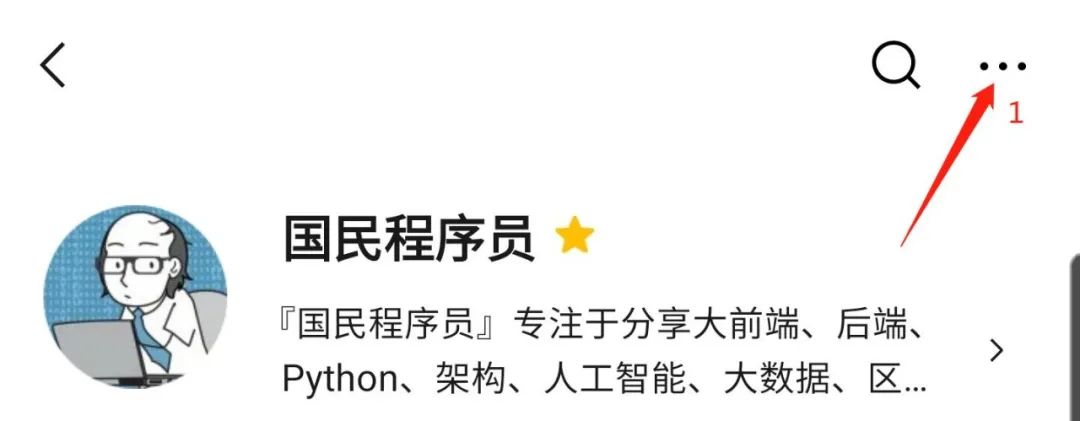关于Kotlin语法,你只需要这一篇就够了!
每天满满的干货
我们之所以活得累,往往是因为放不下面子来做人。
由于微信公众号近期改变了推送规则如果你第一时间看到我的文章就置顶星标公众号。


原文地址:
https://blog.csdn.net/ddnosh/article/details/115327206
文章目录
1. GitHub地址
2. Kotlin Grammar
3. Kotlin Advanced
4. Kotlin in Android
1. GitHub地址
https://github.com/ddnosh/weekly-sample-kotlin
2. Kotlin Grammar
fun main(args: Array<String>) {
println("this is my first kotlin.")
/*
1. val:常量; var:变量
*/
val name = "Jack"
// name = "Rose" //报错
var age = 18
age = 20;
//也可明确类型
var count: Int = 100
/*
2. 换行: 1. \n; 2. """ +|
*/
val line = "here is one line\nthis is another line"
println(line)
val newLine = """here is one newLine
|here is another newLine""".trimMargin()
println(newLine)
/*
3. 字符串模板、占位符:$
*/
var template = "this is a template string called $name and length is ${name.length}"
println(template)
/*
4. null: ? ?. ?: !!
*/
var nullableString1: String? = "abc" //?可为空, 不加?则不能为空
var nullableString2: String? = null
println(nullableString1?.length)//?.如果为空则返回null, 不为空则返回实际值
println(nullableString2?.length)
println(nullableString2?.length ?: "i am null")//?:如果为空则用:后面的赋值
// println(nullableString2!!.length)//!!如果为空则强制抛异常
var nameNullable: String? = null
var len = nameNullable?.length
println(len == null)
/*
5. 延迟初始化: lateinit var, by lazy
*/
lateinit var lateInitByLateinit: String//lateinit var只能用来修饰类属性, 不能用来修饰局部变量和基本类型
fun testLateInit() {
lateInitByLateinit = "this is a lateinit string"
}
testLateInit()
println(lateInitByLateinit)
//by lazy用来修饰val变量, 可以用来修饰局部变量和基本类型,等下一次调用到的时候才会进行初始化
val lazyByLazy: String by lazy {
println("here is lazy init")
"Zoo"
}
println(lazyByLazy)//lazyByLazy被调用到了,开始初始化,执行println("here is lazy init"),并且赋值"Zoo"
/*
6. is 判断类型
*/
val isString: String? = "kotlin"
if (isString is String) {
println("it's string")
}
/*
7. as 类型转换
*/
val y: Int? = 123;
val x: String? = y as? String;
println(x);
/*
8. 方法
*/
//step1: 标准写法
fun method1(name: String): String {
return "hello $name"
}
//step2: 如果返回值类型可以由编译器推断出来,则可以省略返回值类型
fun method2(name: String) = {
"hello $name"
}
//step3: 函数只有单个表达式,则可以省略花括号,直接写在=后
fun method3(name: String) = "hello $name"
//step4: 具有代码块的函数,必须显示指明返回类型
fun method4(): Int {
println("this is 100")
return 100
}
println(method1("kotlin1"))
println(method2("kotlin2"))
println(method3("kotlin3"))
println(method4())
//void返回类型
fun testVoid(): Unit {//Unit = java's void
println("this is a void fun")
}
fun testVoidWithoutUnit() {
println("this is a void fun without unit")
}
fun methodWithMultipleArgs(vararg name: String) {//多个参数
println("params size is ${name.size}")
}
methodWithMultipleArgs("aaron")
methodWithMultipleArgs("aaron", "beyond")
fun methodWithOneLine(age: Int): Boolean = age == 20
println(methodWithOneLine(20))
//@JvmStatic and @JvmField
println(JvmClass.name);
//方法入参可以指定默认值
fun sayHello(who: String = "Jerry", msg: String = "Hello") {
println("$who - said - $msg")
}
sayHello()
/*
9.1 Class
*/
//open表示此类可以被继承, 用在函数上面表示此函数可以被重写
open class KotlinClass(val name: String) {
open fun print(content: String?) {
println(this.name + content)
}
}
val kotlinClass = KotlinClass("Charles")
kotlinClass.print(" say: hello")
/*
9.2 Class extends Class and Implements interface
*/
class SubKotlinClass(name: String) : KotlinClass(name), CallBack { //父类构造函数直接赋值, 不再调用super
override fun getName(id: Int) {
println("id = $id")
}
override fun print(content: String?) {
println(this.name + content + "!!!")
}
}
val subKotlinClass = SubKotlinClass("Sub")
subKotlinClass.print(" say: hello")
/*
9.3 Class with primary constructor, 主构造器定义在类头部, 因此需要init空间做初始化
*/
class KotlinClassConstructor1 constructor(name: String) {
val name: String
init {
this.name = name
}
}
val kotlinClassConstructor1 = KotlinClassConstructor1("Jack")
println("kotlinClassConstructor:${kotlinClassConstructor1.name}")
/*
9.4 Class with primary constructor, 主构造器定义在类头部, 也可以在类的属性初始化声明处
*/
class KotlinClassConstructor2 constructor(name: String) {
val prop: String = name.toUpperCase()
}
/*
9.5 Class with primary constructor, 如果主构造函数没有注解或可见性说明,则 constructor 关键字可以省略
*/
class KotlinClassConstructor3(name: String) {
}
/*
9.6 Class with primary constructor, 声明属性并在主构造函数中初始化更简洁的写法
*/
class KotlinClassConstructor4(var name: String) {
}
val kotlinClassConstructor4 = KotlinClassConstructor4("Jack")
println("kotlinClassConstructor:${kotlinClassConstructor4.name}")
/*
9.7 Class with secondary constructor, 次级构造器, 可以有多个
*/
class KotlinClassSecondaryConstructor {
private var name: String
private var age: Int = 0
private var male: Boolean = false
constructor(name: String) {
this.name = name;
}
constructor(name: String, age: Int) {
this.name = name
this.age = age
}
constructor(name: String, age: Int, male: Boolean) : this(name, age) {
this.name = name
this.age = age
this.male = male
}
fun print() {
println(this.name)
}
}
val kotlinClassSecondaryConstructor1 = KotlinClassSecondaryConstructor("Michael")
kotlinClassSecondaryConstructor1.print()
val kotlinClassSecondaryConstructor2 = KotlinClassSecondaryConstructor("Michael", 18, true)
kotlinClassSecondaryConstructor2.print()
/*
9.8 class without body
*/
class withoutBody
/*
9.9 DataClass
*/
data class DataClassSample(val x: Int, val y: Int)
val data = DataClassSample(100, 200)
println(data.x + data.y)
/*
10.1 ArrayList and for
*/
val names = arrayListOf<String>("dog", "cat")
for (name in names) {
println("names contains:$name")
}
for (i in 0 until names.size) {//从0一直到names.size - 1, 方便数组遍历而设计
println("[for until]names contans:${names[i]}")
}
/*
10.2 Map
*/
val ages = mapOf<String, Int>("a" to 1, "b" to 2)
for ((key, value) in ages) {
println("$key -> $value")
}
/*
10.3 可变数组
*/
val bags = mutableListOf(1, 2, 3)
bags.add(4)
println(bags.last())
println(bags[0])
/*
10.4 while
*/
var cnt: Int = 0;
while (cnt < 5) {
println(cnt++)
}
if (cnt == 5)
println("cnt = 5")
/*
10.5 when: 等价于switch
*/
var a = 1
val b = 2;
val c = 3
when (b) {
1 -> println("the result is 1")
2 -> {
a = 11
println(a)
}
1, 2 -> println("1 or 2")
in 1..2 -> println("in 1 and 2")
else -> {
println("nothing")
}
}
/*
10.6 单例
*/
println(Utils1.label)
println(Utils2.hello())
/*
10.7 static
*/
println(CompanionTest.name)
println(CompanionTest.run())
/*
10.8 getter and setter
*/
val getterAndsetter = KotlinGetterAndSetter()
getterAndsetter.x = 100
println("getter and setter:" + getterAndsetter.x)
//getter and setter 二次赋值
val person = Person()
println("name:${person.name}")
person.name = "hello world"
println("name:${person.name}")
person.age = -1
println("name:${person.age}")
/* 11. 内联函数
apply let run with also
函数体对象 this it this this it
对象是否可省 可 不可 可 可 不可
返回值 必有,当前对象 最后一行,可有可无 最后一行,可有可无 最后一行,可有可无 必有,当前对象
可否判空 可以 可以 可以 不可以 可以
*/
//let -> 闭包内使用it作为当前这个对象的参数; 返回值是函数最后一行, 或者return语句
fun letTest(): Int {
// fun <T, R> T.let(f: (T) -> R): R { f(this)}
"letTest".let {
println(it)
return 1
}
}
println(letTest())
//apply -> 闭包内可以任意调用此对象; 并且最终也会返回此对象
fun applyTest() {
// fun <T> T.apply(f: T.() -> Unit): T { f(); return this }
ArrayList<String>().apply {
add("applyTest")
println("this = $this, size = $size")
}.let { println(it) }
}
applyTest()
// apply with null and nonnull
val strJim: String? = null
strJim?.apply {
println("apply with nonnull")
} ?: strJim.apply {
println("apply with null")
}
//with -> 闭包内可以任意调用此对象; 返回值是函数最后一行, 或者return语句
fun withTest() {
// fun <T, R> with(receiver: T, f: T.() -> R): R = receiver.f()
with(ArrayList<String>()) {
add("withTest")
println("this = $this, size = $size")
}.let { println(it) }
}
withTest()
//run -> run只接收一个lambda函数为参数; 返回值是函数最后一行, 或者return语句
fun runTest() {
// fun <T, R> T.run(f: T.() -> R): R = f()
"runTest".run {
println("this = " + this)
}.let { println(it) }
}
runTest()
//run用来判空
val s = null
s?.run {
} ?: run {
println("use run to identify null")
}
//also
fun alsoTest() {
val car = Car("Benz")
car.also {
it.name = "BMW"
}
println("car's name is ${car.name}")
}
alsoTest()
/*
12. 其它
*/
//test anonymous inner class about interface
callback.getName(123)
//@JvmOverloads, 声明多个参数的构造函数
val animal = Animal()
animal.func("dog")
animal.func("dog", 2)
animal.func("dog", 2, "New York")
//lambda表达式
val lambdaTest1 = LambdaTest1()
lambdaTest1.setTheCallBack(object : CallBack {
override fun getName(id: Int) {
println("getName")
}
})
//if the callback defined in java
lambdaTest1.setTheCallBackFromJava(CallBackFromJava {
println("getName")
})
val lambdaTest2 = LambdaTest2()
lambdaTest2.setCallBack({ id -> println("getName") })
lambdaTest2.setCallBack { id -> println("getName") }
lambdaTest2.setCallBack { println("getName") }
//lambda使用下划线_, 没有用到的就用_代替
val aa = mapOf(1 to "a", 2 to "B")
aa.forEach { (_, value) -> println("value:$value") }
// chain use
var list = arrayOf("java", "c++", "Android", "Kotlin", "iOS")
list.map {
"Hello $it"
}.filter {
!it.contains("c")
}.forEach {
println(it)
}
}
//new a interface
private val callback = object : CallBack {
override fun getName(id: Int) {
println("CallBack -> getName")
}
}
/*
Object: 单例, Object修饰的类为静态类, 里面的方法和变量都是静态的
*/
object Utils1 {
val label: String
get() {
if (true)
return "here is singleton fun"
else
return ""
}
}
object Utils2 {
fun hello() {
println("here is an object demo")
}
}
/*
Interface
*/
//interface CallBack {
// fun getName(id: Int)
//}
interface CallBack2 {
fun getName(id: Int)
fun getVersion() = 1 // can offer non-abstract method
}
/*
companion object:伴生对象,相当于java中的static
*/
class CompanionTest {
companion object { //一个类中只能存在一个伴生对象
val name: String = "Vincent"
fun run() {
println("I am running!")
}
}
}
/*
getter and setter: 自带, 默认隐藏
*/
class KotlinGetterAndSetter {
var x: Int = 0
set(value) {
field = value
}
get() = field
}
class Person {
var name: String = "Tom"
set(value) {
field = value
}
get() = field.toUpperCase()
var age: Int = 100
set(value) {
if (value < 0) {
field = 0
} else {
field = value
}
}
get() = field
}
/*
@JvmStatic and @JvmField,主要是方便java调用,不用再在java中写.INSTANCE调用kotlin代码
*/
open class JvmClass {
companion object {
@JvmField
val name: String = "jvm test"
@JvmStatic
fun method() {
println("call method")
}
}
}
class Animal {
//define multiple constructor
@JvmOverloads
fun func(a: String, b: Int = 0, c: String = "abc") {
}
}
class Car(var name: String) {
}
class LambdaTest1 {
var callback: CallBack? = null
var callbackfromjava: CallBackFromJava<Any>? = null
fun setTheCallBack(callback: CallBack) {
this.callback = callback
}
fun setTheCallBackFromJava(callbackfromjava: CallBackFromJava<Any>) {
this.callbackfromjava = callbackfromjava
}
}
class LambdaTest2 {
lateinit var callback: (CallBack) -> Unit
fun setCallBack(callback: (CallBack) -> Unit) {
this.callback = callback
}
}
class User(var name: String, var age: Int) {
}
3. Kotlin Advanced
fun main(args: Array<String>) {
/*
1. lambda表达式
*/
//(1) kotlin中lambda表达式定义在{}中
//(2) 其参数(如果存在)在 -> 之前声明(参数类型可以省略)
//(3) 函数体(如果存在)在 -> 后面
//源代码:无参
fun l1() {
println("无参数")
}
//lambda表达式: 以值的形式传递
val l1 = { println("无参数") }
//调用
l1()
//源代码:有参
fun l2(x: Int, y: String) {
println(y.length + x)
}
//lambda表达式: 以值的形式传递
val l2 = { x: Int, y: String -> println(y.length + x) }
//调用
l2(1, "Mike")
//lambda表达式可以直接通过run运行
run { l2(1, "tom") }
//lambda简化过程
val people = listOf(User("张三", 18), User("李四", 20))
//1.1 函数只有lambda一个实参
//原始完整代码
println("年纪最大:" + people.maxBy({ user: User -> user.age }))
//step1:如果lambda表达式是函数调用的最后一个实参,它可以放在括号外面
println("年纪最大:" + people.maxBy() { user: User -> user.age })
//step2:当lambda是函数唯一的实参时,可以去掉函数调用的括号
println("年纪最大:" + people.maxBy { user: User -> user.age })
//step3:如果lambda的参数的类型可以推导,那么可以省略参数的类型
println("年纪最大:" + people.maxBy { user -> user.age })
//step4:对于lambda中一个参数时,可以使用默认参数名称it来代替命名参数,并且lambda的参数列表可以简化,省略参数列表和->
println("年纪最大:" + people.maxBy { it.age })
//1.2 函数有除了lambda外多个实参
fun lambdaTest1(a: Int, b: (String) -> String) {
println("$a + ${b(a.toString())}")
}
fun lambdaTest2(b: (String) -> String, a: Int) {
println("$a + ${b(a.toString())}")
}
lambdaTest1(11) {
"hello: $it"
}
lambdaTest2({ "hello: $it" }, 22)
//定义匿名函数,赋值给test变量
var test = fun(x: Int, y: Int): Int {
return x + y
}
//通过test调用匿名函数
println(test(2, 4))
/*
2. 函数作为参数传递, 可以用作回调: T.()->Unit 和 ()->Unit
接受函数作为参数或者返回一个函数的函数就叫做高阶函数
*/
//() -> Unit//表示无参数无返回值的Lambda表达式类型
//(T) -> Unit//表示接收一个T类型参数,无返回值的Lambda表达式类型
//(T) -> R//表示接收一个T类型参数,返回一个R类型值的Lambda表达式类型
//()->Unit
//2.1 不带参数和返回值的函数作为形参
fun action0(method: () -> Unit) {
method()
println("this is action0")
}
fun method0() {
println("this is method0 which is invoked")
}
action0 {
println("this is action0")
}
fun action1(first: Int, method: () -> Unit) {
method()
println("this is action1")
}
//format->step1
action1(1, {
println("第1种写法")
})
//format->step2
action1(1) {
println("第2种写法")
}
val method: () -> Unit = {
println("第3种写法")
}
action1(1, method)
//2.2 带参数和返回值的函数作为形参
fun method1(msg1: Int, msg2: Int): Int {
println("this is method1")
return msg1 + msg2;
}
fun getResult1(
arg01: Int,
arg02: Int,
method: (arg1: Int, arg2: Int) -> Int
) {
println("----->msg:before")
val ret = method(arg01, arg02);
println("----->msg:after = $ret")
}
println(getResult1(1, 2, ::method1))
//T.()->Unit
fun getResult3(
method: Test.() -> Unit
) {
println("----->msg:before")
val test1 = Test()
test1.apply(method)
println("----->msg:after ${test1.a}")
}
println(
getResult3(
{
a = "Tim"
})
)
//2.3 函数作为参数, 指定加载位置和时机
var host = false
fun isHost() = host
suspend fun getFromNet() {
withContext(Dispatchers.IO) {
delay(1000)
host = true
}
}
fun load(checkHost: () -> Boolean) {
GlobalScope.launch() {
getFromNet()
if (checkHost.invoke()) println("yes, it's the host") else print("no, it's not the host")
}
}
load { isHost() }
/*
3.1 类委托
*/
val b = BaseImpl(10)
Derived(b).print() // 输出 10
Derived(b).otherPrint() //输出other
/*
3.2 属性委托
*/
val isLogin: Boolean by DerivedProperty("tom")
if (isLogin) {
println("this is a property when invoked")
}
/*
4. 协程
*/
// 4.1 RxJava和协程的区别
fun getUser(): Observable<String> {
val random = Random()
return Observable
.create { emitter: ObservableEmitter<String> ->
//模拟网络请求
println("I'm doing network,CurrentThread is " + Thread.currentThread().name + "...")
Thread.sleep(1000)
if (random.nextBoolean()) {
emitter.onNext("Jack")
} else {
emitter.onError(TimeoutException("Net Error!"))
}
}
.subscribeOn(Schedulers.io())//指定网络请求在IO线程
}
fun rxjava() {
getUser()
.subscribe(object : Observer<String> {
override fun onComplete() {
}
override fun onSubscribe(d: Disposable) {
}
override fun onNext(t: String) {
println(t)
}
override fun onError(e: Throwable) {
}
})
Thread.sleep(2000)//延时2s,避免主线程销毁
}
//run
rxjava()
/* 4.2
1. 可在全局创建协程: launch和runBlocking
(1)launch是非阻塞的;
(2)runBlocking是阻塞的;
2. 可返回结果的协程: withContext和async
(1)withContext与async都可以返回耗时任务的执行结果;
(2)多个withContext任务是串行的, withContext可直接返回耗时任务的结果;
(3)多个async任务是并行的, async返回的是一个Deferred<T>, 需要调用其await()方法获取结果;
*/
//4.2.1.1: launch
GlobalScope.launch {
delay(1000)
println("1.执行launch, [当前线程为:${Thread.currentThread().name}]")
}
println("2.Run launch, [当前线程为:${Thread.currentThread().name}]")
//指定运行在主线程中
// GlobalScope.launch(Dispatchers.Main) { println(Thread.currentThread().name) }
//4.2.1.2: runBlocking
runBlocking {
delay(500) //延时500ms
println("1.执行runBlocking, [当前线程为:${Thread.currentThread().name}]")
}
println("2.Run runBlocking, [当前线程为:${Thread.currentThread().name}]")
//4.2.2.1: withContext
GlobalScope.launch {
val time1 = System.currentTimeMillis()
val task1 = withContext(Dispatchers.IO) {
delay(2000)
println("1.执行withContext-task1.... [当前线程为:${Thread.currentThread().name}]")
"one" //返回结果赋值给task1
}
val task2 = withContext(Dispatchers.IO) {
delay(1000)
println("2.执行withContext-task2.... [当前线程为:${Thread.currentThread().name}]")
"two" //返回结果赋值给task2
}
println("执行withContext-task1 = $task1 , 执行withContext-task2 = $task2 , 耗时 ${System.currentTimeMillis() - time1} ms [当前线程为:${Thread.currentThread().name}]")
}
//4.2.2.1: async
GlobalScope.launch {
val time1 = System.currentTimeMillis()
val task1 = async(Dispatchers.IO) {
delay(2000)
println("1.执行async-task1.... [当前线程为:${Thread.currentThread().name}]")
"one" //返回结果赋值给task1
}
val task2 = async(Dispatchers.IO) {
delay(1000)
println("2.执行async-task2.... [当前线程为:${Thread.currentThread().name}]")
"two" //返回结果赋值给task2
}
println("执行async-task1 = ${task1.await()} , async-task2 = ${task2.await()} , 耗时 ${System.currentTimeMillis() - time1} ms [当前线程为:${Thread.currentThread().name}]")
}
//4.2.3: 线程切换
GlobalScope.launch(Dispatchers.Unconfined) {
println("Dispatchers.Unconfined: ${Thread.currentThread().name}")//输出false
//上下文切换到主线程
GlobalScope.launch(Dispatchers.IO) {
println("Dispatchers.IO: ${Thread.currentThread().name}}")//输出true
}
}
//4.3 Scope: 协程作用范围
//GlobalScope:表示此协程的生命周期随应用程序的生命周期, 没有和生命周期组件相关联
//CoroutineScope:在应用中具有生命周期的组件应该实现CoroutineScope接口, 并负责该组件内 Coroutine 的创建和管理;
// 以Activity为例, 比如标准库中定义的MainScope(), 另外参考KotlinInAndroid中的ScopedActivity和SimpleScopedActivity
//viewModelScope(androidx.lifecycle.viewModelScope, androidx.lifecycle.lifecycleScope)
/*
5. 扩展函数
*/
fun ExtClass.foo() = println("ext") // when the same as the member foo
fun ExtClass.foo(para: Int) = println("ext")
ExtClass().foo()
ExtClass().foo(0)
/*
6. 闭包:函数中包含函数
*/
val plus = { x: Int, y: Int -> println("$x plus $y is ${x + y}") }
val hello = { println("Hello Kotlin") }
fun closure(args: Array<String>) {
{ x: Int, y: Int ->
println("$x plus $y is ${x + y}")
}(2, 8) // 自执行的闭包
plus(2, 8)
hello()
}
/*
7. 单例
*/
println("Singleton: " + Single.get().pro)
/*
8. Kotlin海量操作符, 替代RxJava操作符
*/
fun rxjavaOperators() {
//定义一个数组
val index = listOf(0, 1, 2, 3, 4, 5, 6, 7, 8, 9)
// Observable
// .just(index)
// .flatMap(object : Function<List<Int>, Observable<Int>> {
// override fun apply(f: List<Int>): Observable<Int> {
// return Observable.fromIterable(f)
// }
// })
// .filter(object : Predicate<Int> {
// override fun test(p: Int): Boolean {
// return p % 2 == 0
// }
// })
// .map(object : Function<Int, String> {
// override fun apply(f: Int): String {
// return "[rxjava]String" + f
// }
// })
// .subscribe(object : Consumer<String> {
// override fun accept(t: String?) {
// println(t)
// }
// })
Observable
.just(index)
.flatMap { Observable.fromIterable(it) }
.filter { it % 2 == 0 }
.map { "[rxjava]String$it" }
.subscribe { println(it) }
}
rxjavaOperators()
fun kotlinOperators() {
val index = listOf(0, 1, 2, 3, 4, 5, 6, 7, 8, 9)
index.filter { it % 2 == 0 }
.map { "[kotlin]String$it" }
.also { println(it) }
}
kotlinOperators()
//将主线程延迟退出, 保证上面延时操作完成
Thread.sleep(5000)
}
class ExtClass {
fun foo() = println("origin")
}
class Test {
var a: String? = null
}
// 创建接口
interface Base {
fun print()
}
// 实现此接口的委托类
class BaseImpl(private val x: Int) : Base {
override fun print() {
println(x)
}
}
// 通过关键字 by 建立代理类, 能够调用委托类已实现的方法和属性,不需再实现print()方法
class Derived(b: Base) : Base by b {
fun otherPrint() {
println("other")
}
}
class DerivedProperty<T>(private val name: String) {
operator fun getValue(thisRef: Any?, property: KProperty<*>): T {
println("this is a property delegate: $name")
return when (name) {
"tom" -> true as T
"jerry" -> false as T
else -> false as T
}
return true as T
}
}
class Single private constructor() {
val pro: Boolean = false
companion object {
fun get(): Single {
return Holder.instance
}
}
private object Holder {
val instance = Single()
}
}
4. Kotlin in Android
class KotlinInAndroid : AppCompatActivity() {
override fun onCreate(savedInstanceState: Bundle?) {
super.onCreate(savedInstanceState)
setContentView(R.layout.activity_main)
//1. 控件直接用id, 不再使用findviewbyid
btn_1.setOnClickListener(object : View.OnClickListener {
override fun onClick(v: View?) {
toastMe()
}
})
btn_1.setOnClickListener { toastMe() } //lambda表达式更加简洁
//2. 控件自定义方法
iv_1.loadUrl("https://www.baidu.com/img/bd_logo1.png")
//3. 扩展函数: 控件自定义方法可放在单独的类中
toast("a toast")
toast("a toast", Toast.LENGTH_LONG)
//4. 协程
//两个耗时操作,必须要在异步线程实现处理,处理完成后需要在主线程输出结果
//way1:
MainScope().launch {
val startTime = System.currentTimeMillis()
println("[way1]tag1:" + Thread.currentThread().name)
val text1 = withContext(Dispatchers.IO) {
println("[way1]tag2:" + Thread.currentThread().name)
delay(1000)
"Hello "
}
val text2 = withContext(Dispatchers.IO) {
println("[way1]tag3:" + Thread.currentThread().name)
delay(1000)
"World!"
}
println("[way1]tag4:" + Thread.currentThread().name)
println(text1 + text2)
println("[way1]耗时:" + (System.currentTimeMillis() - startTime))
}
//way2:
MainScope().launch {
val startTime = System.currentTimeMillis()
println("[way2]tag1:" + Thread.currentThread().name)
val text1 = getHello("[way2]")
val text2 = getWorld("[way2]")
println("[way2]tag4:" + Thread.currentThread().name)
println(text1 + text2)
println("[way2]耗时:" + (System.currentTimeMillis() - startTime))
}
//way3:异步,不阻塞
MainScope().launch {
val startTime = System.currentTimeMillis()
println("[way3]tag1:" + Thread.currentThread().name)
val text1 = async { getHello("[way3]") }
val text2 = async { getWorld("[way3]") }
println("[way3]tag4:" + Thread.currentThread().name)
println(text1.await() + text2.await())
println("[way3]耗时:" + (System.currentTimeMillis() - startTime))
}
//way4:
GlobalScope.launch(Dispatchers.Main) {
var name = getResultFromNet()
showResult(name)
}
//5. set赋值, text替换setText
btn_1.text = "click me......"
//6. scoped activity
btn_2.setOnClickListener {
startActivity(Intent(this, SimpleScopedActivity::class.java))
}
}
private fun toastMe() {
Toast.makeText(this, "clicked!", Toast.LENGTH_LONG).show()
}
fun ImageView.loadUrl(url: String) {//在任何类上添加函数
Glide.with(iv_1.getContext()).load(url).into(iv_1)
}
private suspend fun getHello(way: String): String {
return withContext(Dispatchers.IO) {
println("$way tag2:" + Thread.currentThread().name)
delay(1000)
"Hello "
}
}
private suspend fun getWorld(way: String): String {
return withContext(Dispatchers.IO) {
println("$way tag3:" + Thread.currentThread().name)
delay(1000)
"World!"
}
}
private suspend fun getResultFromNet(): String {
var name = ""
withContext(Dispatchers.IO) {
for (i in 0..1000000) {
//这里模拟一个耗时操作
}
name = "ddnosh"
}
return name
}
private fun showResult(result: String) {
println("[way4]=$result")
}
}
————————————————







